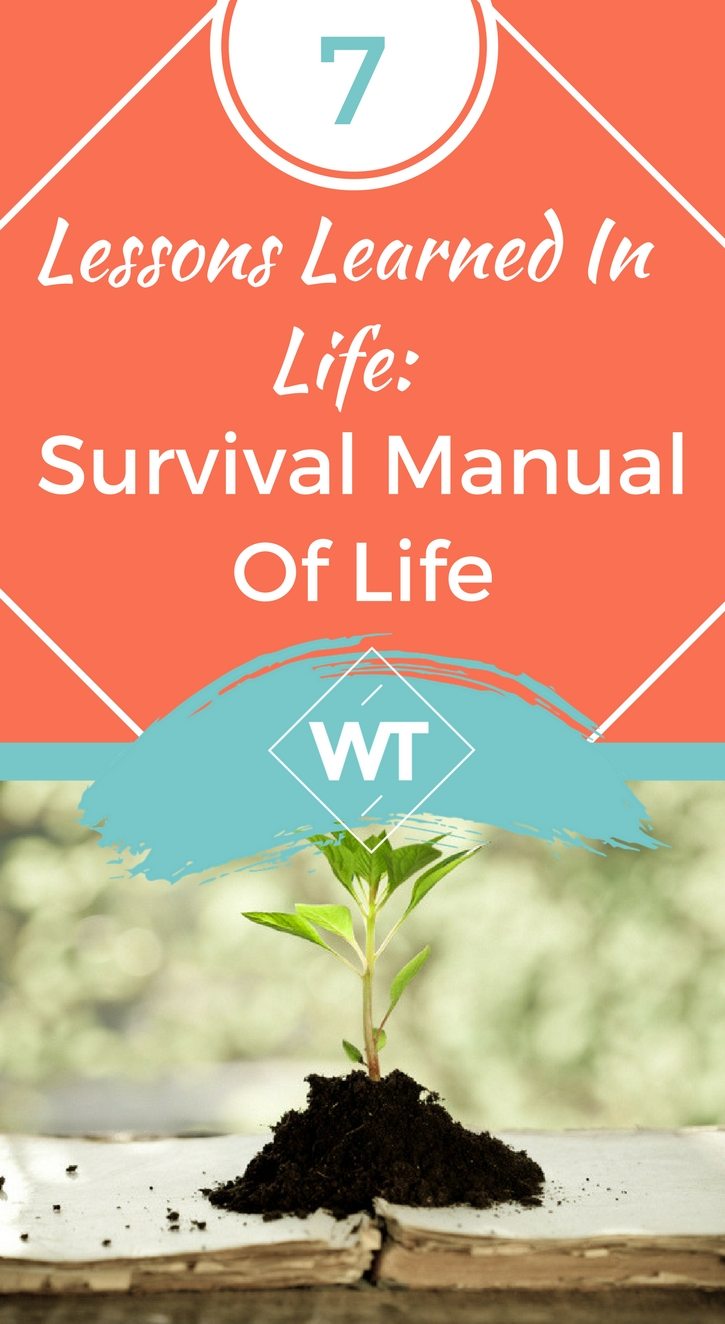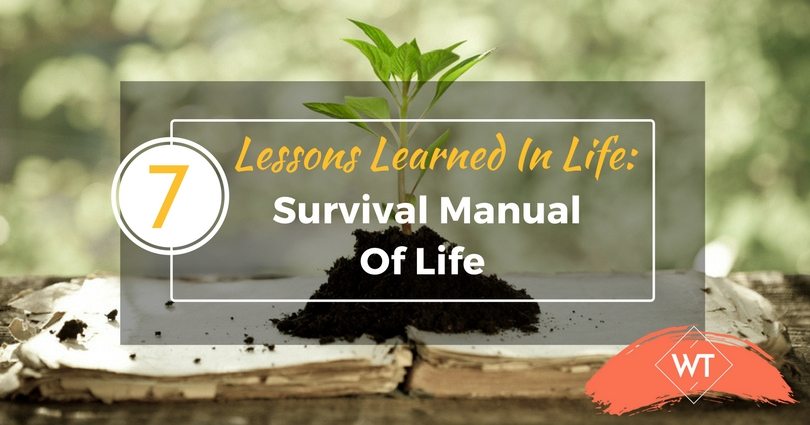7 Lessons Learned In Life: Survival Manual Of Life

Of course our lessons learned in life come from no manual whatsoever. We have to figure out most of the things ourselves or learn through others who have had certain experiences before us.
Yet there are some basic lessons learned in life that can always be codified into a simple ‘manual’—a survival manual if you will—to help us navigate through life’s obstacles and dire situations. Better still, would be if it could prepare us for eventualities before they arise by developing certain basic, but important dispositions.
My key 7 lessons learned in life
If I had to write or contribute to this survival manual about my lessons learned in life . . . and were asked to choose the most important ones, I would definitely pick the below seven:
1. Your mind is the biggest enemy
In any survival manual, you will always first learn where the danger lies or who the enemy is. And in the survival manual of life, our biggest enemy is our own mind. So we always have to be aware of this stark point at any moment. We naturally try to project the cause of our mishaps or suffering to something external—luck, other people, some higher external power, and so on.
This can only alienate us from the truth that we have the power and the response-ability to change internally first (both our thinking and our perception) instead of looking for external causes. Once we grasp this truth and absorb it in our everyday living, we start changing our reality with all of its perceived or misperceived dangers. We would have tamed our biggest enemy.
2. Pick it up and move on
One of the most important lessons learned in life for our imaginary survival manual is to maintain constancy when everything is continually changing, disrupting or breaking our flow. Actually it is not only a key to survive life’s battering waves but a path to self-mastery. Persistence and perseverance are the facets of being constant.
Life is constantly throwing things at us. Whether they become disruptions, irrelevant, or opportunities for change is a matter of how we respond to them. When we get disrupted, we break our flow. We slow down or become immobilized. We momentarily shut down the energies or resources needed to keep growing and expanding.
So an important piece of advice is to always keep moving even if it feels pointless, futile or aimless. Just pick it up from where you left off and keep moving without looking back or being stuck in the moment.
The idea is that if you keep moving, even if you feel lost or confused at that particular moment, you distract your mind away from falling into a loop of self-destructive or sabotaging thought patterns and feelings such as: self-pity, self-doubt, a sense of worthlessness and a general lack of trust in life.
Moving on does not mean to frenetically do one thing after the other without ever stopping to reflect or process what’s going on. It means not stopping long enough to risk losing sight of your mission.
3. Keep focused on the essentials
Dangers—real or perceived—are not the only thing to watch out for. There are also distractions and in today’s world there are lots of them. Anything from multi-media messages, advertising, false ideas to useless ‘commodities’ cluttering our spaces. We live in a consumer-driven society that has completely blurred the lines between our wants and needs. We are constantly accumulating a baggage of inessential things—both mental or physical.
Living among the inessential slows us down or deviates us from the path of our life purpose. It obstructs our view from what is authentic and essential. You need to travel light and to do so you need to shed off all the inessential things.
4. Don’t wait for others’ approval
Besides external distractions as shown above by the point about inessentials, there is also internal conditioning that we need to beware of. One of the most limiting conditions is the fear of not getting approval by others. When we are constantly minding whether we receive others’ approval we end up doing things that are not authentically ours, hence not aligned with our life purpose.
5. Keeping perspective
When things go awfully wrong or unexpected mishaps come knocking on our door, the crucial thing is to keep perspective. Keeping perspective means above all not to be swallowed whole by our biases, subjective perceptions and feelings. It means not to cave in to fear or doubt and to be able to see beyond the moment, no matter how narrow or daunting it seems.
It is being able to remind ourselves that there were countless episodes when we later learned that things turned out to be quite different than we thought and seemingly ‘big tragedies’ that were nothing more than small problems waiting to be solved.
6. ‘Seeing it Happen’ and the Swiss Army Knife of creative imagination
There is no doubt that one of the greatest lessons learned in life comes from the one thing that successful and self-actualized people from all walks of life have in common: putting their imagination to good use. This does not mean they end up day-dreaming or fantasizing about life all the time—that would only be a distraction.
It means that their imagination makes their mind supple enough to extend beyond their current reality or situation. They ‘see’ things when they still have not happened; they visualize their goal when it’s still far from reach; they see a positive outcome to an apparent dire and grim situation.
This is the power of imagination. It gives us the incredible power of dreaming our reality into being. It creates and mobilizes internal resources to work towards a clear goal through the use of creative imagination.
7. Fetch the opportunity in the crisis
Crisis bring with them a strong opportunity for change. In fact all deep changes in nature happen by crisis. The human world is also no exception. When we face a life crisis we realize that our points of references, our identities and things we took for granted are no longer there.
We are left with a big rift—a void that scares us immensely but which can make us take a completely different perspective on life. That void can be filled in with new ideas that couldn’t have had a place before. It gives us the opportunity to regenerate, transform and dump certain inauthentic or limiting beliefs that were limiting us or holding us back.
One has to be careful though how we replace our old beliefs. When facing the void, some people feel the urge to quickly fill it in by whatever comes their way which can lead them astray. Instead, one has to take the opportunity to reflect on his life purpose and find authenticity.
Conclusion
I can’t give you all the answers—I don’t even have them all myself. But I can offer you a great place to start. Begin with these 7 lessons learned in life, and from there maybe explore a bit more and see where that takes you. A good place to start might be these quotes from Alan Watts. I have found them to be both thought-provoking and impactful.









Leave a Reply